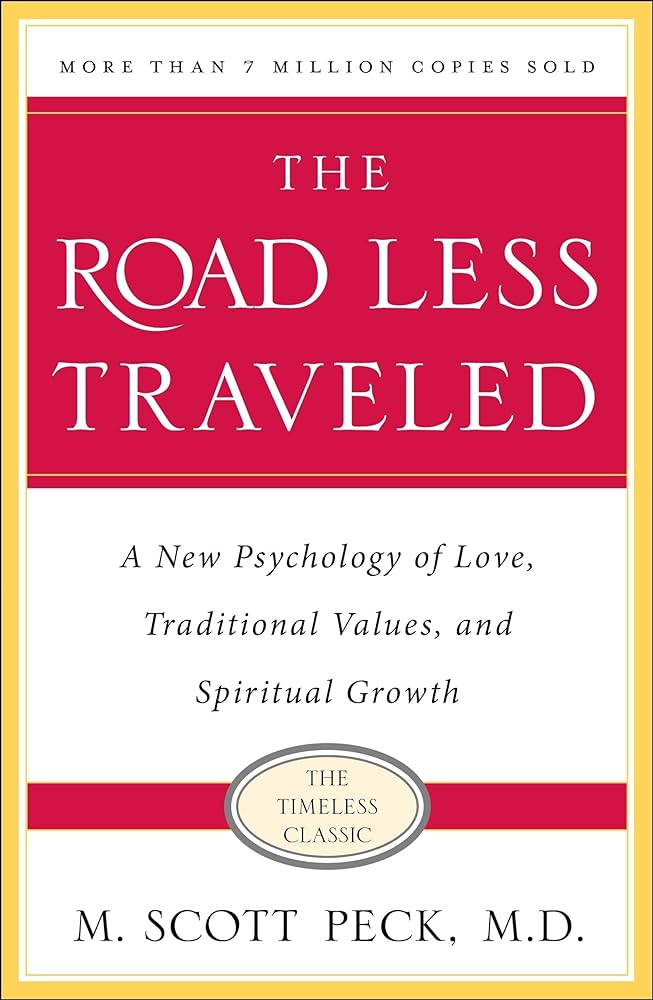The Nature of Love
When M. Scott Peck pens down his thoughts on love in "The Road Less Traveled," he redefines our understanding of this all-encompassing emotion. Love, as Peck describes it, transcends the conventional bounds of mere sentimentality or romantic entanglement. It emerges as an active choice, a deliberate effort we make for the spiritual growth of ourselves and others.
"Love is the will to extend one's self for the purpose of nurturing one's own or another's spiritual growth," Peck writes, encapsulating his profound interpretation. This perspective shatters the traditional myth that love is something that happens to us, suggesting instead that it's something we cultivate with intention and effort.
Peck challenges us to view love as a form of labor—a sustained choice that demands strength and courage. It's not just about the euphoria of being in love but about the deliberate actions we undertake to care for and nurture another human being, even when it's difficult. This labor of love is what leads to true emotional and spiritual development.
In a world where love is often relegated to the confines of romantic plotlines or fairy-tale endings, Peck's interpretation is a refreshing call to action. His viewpoint suggests that love is not just about finding the right person but also about being the right person. It's about extending beyond our own needs and comforts to foster growth, understanding, and connection.
Through his insightful narrative, Peck offers a lens to view love not as an effortless feeling but as a journey of discipline, sacrifice, and continual growth. He invites us to step onto this less-traveled road, where love is an evolving, dynamic process—a challenging yet immensely rewarding journey towards personal and spiritual fulfillment.
Personal Responsibility
Embarking on the enlightening journey of "The Road Less Traveled," we delve into the essence of what it truly means to take charge of our own lives. M. Scott Peck, with his insightful wisdom, nudges us towards embracing life's complexities with open arms.
At the very heart of this exploration lies the profound understanding that life, in all its unvarnished truth, is difficult. This acknowledgment isn't a call for despair but rather an invitation to step into a realm of empowerment. As Peck eloquently puts it, "Once we truly know that life is difficult—once we truly understand and accept it—then life is no longer difficult."
This book brilliantly redefines the concept of responsibility. It's not just about being accountable for our actions but also about how we perceive and react to life's endless challenges. It's a clarion call to stop viewing problems as nuisances but as critical steps in our journey of personal growth.
Through engaging narratives and profound insights, Peck encourages us to shift our perspective. Problems are not just obstacles but opportunities—gateways to a deeper understanding of ourselves and the world around us. This shift is not just philosophical but immensely practical.
"Problems call forth our courage and our wisdom," asserts Peck, reminding us that it is through facing our difficulties, not avoiding them, that we grow. This responsibility towards ourselves is portrayed not as a burdensome duty but as a liberating path to true freedom.
The Journey of Spiritual Growth
Embarking on a journey of spiritual growth is akin to setting sail on a vast, uncharted ocean. In "The Road Less Traveled," M. Scott Peck enlightens us with the profound understanding that this voyage is not just a facet of our existence but the very essence of our being.
At the heart of this journey, Peck places self-awareness. He masterfully illustrates how the awakening of our consciousness is both the starting point and the pathway to spiritual evolution. As Peck states, “We must be willing to get rid of the life we’ve planned so as to have the life that is waiting for us.” This bold step towards self-awareness is what ignites our voyage, urging us to let go of preconceived notions and embrace the life that truly awaits us.
As the narrative unfolds, Peck emphasizes the role of discipline as a steadfast compass guiding us through the rough waters of spiritual growth. He teaches us that discipline is not a set of restrictions but rather the means to freedom. By practicing delayed gratification, dedication to truth, and a willingness to face reality, we equip ourselves with the tools necessary to navigate the complexities of life.
In Peck’s perspective, love is the beacon of light on this journey. Love, as Peck defined it, is a conscious act of extending oneself for the purpose of fostering one's own or another's spiritual growth, far from the shallow shores of romantic or fleeting feelings. This profound interpretation of love challenges us to transcend our egos and to embrace a love that is genuine and growth-oriented.
In this transformative journey, Peck also addresses the hindrances we may encounter. The shadows of laziness and the fear of pain often deter us from pursuing the arduous path of spiritual growth. However, Peck reassures us with the wisdom that “the truth is that our finest moments are most likely to occur when we are feeling deeply uncomfortable, unhappy, or unfulfilled.” It is in these moments of discomfort that our potential for growth is greatest.
Discipline: The Pathway to Personal Freedom
In "The Road Less Traveled," M. Scott Peck revolutionizes our understanding of discipline, transforming it from a notion of rigidity and denial into a vibrant pathway to freedom and self-love. Peck redefines discipline not as punishment or restriction but as a series of liberating actions that foster deep personal growth and happiness.
At the heart of Peck's perspective is the idea that discipline is a form of self-care. It's about choosing long-term growth over short-term gratification, a concept encapsulated in his words: "Delaying gratification is a process of scheduling the pain and pleasure of life in such a way as to enhance the pleasure by meeting and experiencing the pain first and getting it over with."
Peck dives into the nuances of discipline through four critical aspects: Delaying Gratification, Acceptance of Responsibility, Dedication to Truth, and Balancing. Each aspect builds upon the other, creating a comprehensive framework for personal development.
Delaying Gratification is about mastering the art of waiting, understanding that true joy often comes after facing challenges. It's the willingness to endure necessary pain for the sake of a worthwhile goal.
Acceptance of Responsibility is crucial. Peck emphasizes that we must take charge of our choices and consequences. He asserts, "We cannot solve life's problems except by solving them." This means recognizing that our happiness and pain are largely dependent on our decisions.
Dedication to Truth is about honesty with oneself and others. It's a commitment to reality, an essential factor in emotional health. Peck highlights that truth can often be uncomfortable, but facing it is a discipline in itself.
Finally, Balancing reflects the need for flexibility - the ability to recognize various aspects of our life and give them due attention. It's about understanding our limits and not being extreme in our pursuits.
Peck's exploration of discipline in "The Road Less Traveled" is a call to embrace challenges as opportunities for growth. He guides us to see discipline not as a hurdle, but as a path to genuine self-improvement and inner freedom. It's a reminder that the road less traveled, though demanding, leads to the most rewarding destinations in our personal journeys.
Mental Health and Therapy
Delving into the depths of 'The Road Less Traveled' by M. Scott Peck, we encounter a profound understanding of mental health and therapy, beautifully intertwined with life's intricate tapestry. Peck, with his psychiatrist's lens, paints a vivid picture of the human psyche, emphasizing the journey toward emotional wellness as both challenging and rewarding.
One of the most striking aspects Peck presents is the idea that our mental health is largely under our control. He states, "We cannot solve life's problems except by solving them." This encapsulates his belief that facing our problems head-on is not only necessary for mental health but is an empowering act of self-growth.
Peck's approach to therapy is not just about healing; it's about personal evolution. He views mental health struggles not as signs of weakness or failure, but as opportunities for profound personal development. Therapy, in his eyes, is a transformative process that guides individuals to a deeper understanding of themselves and their place in the world.
Throughout the book, Peck repeatedly emphasizes the importance of self-awareness and honesty in therapy. He suggests that true emotional healing comes from within, stating, "The truth is that our finest moments are most likely to occur when we are feeling deeply uncomfortable, unhappy, or unfulfilled." Here, Peck encourages us to embrace discomfort as a catalyst for change.
The concept of love is also central to Peck's philosophy on mental health. He argues that genuine love is an act of extending oneself for spiritual growth, both for oneself and others. This perspective shifts the focus from love as a feeling to love as a choice, a tool for healing and growth.
In 'The Road Less Traveled', mental health and therapy are not just subjects; they are essential parts of a journey towards a fulfilling and authentic life. Peck's insights inspire us to view our struggles not as burdens, but as stepping stones to a richer, more self-aware existence. His profound understanding of the human condition offers not just solace but a roadmap for anyone seeking to navigate the complexities of the mind and heart.
The Definition and Nature of Love and Evil
Delving into the depths of "The Road Less Traveled," we uncover a profound exploration of love and evil, two forces that profoundly shape our lives and experiences. M. Scott Peck, with his insightful wisdom, takes us on a journey to understand these complex concepts in a way that resonates deeply and meaningfully.
At the heart of Peck's discourse is the idea that love is much more than a mere emotion; it is an action, a behavior, and a choice. It's a nurturing force that fosters spiritual growth in both ourselves and others. He eloquently states, "Love is the will to extend one's self for the purpose of nurturing one's own or another's spiritual growth." This powerful definition reorients our understanding of love from something that happens to us to something we actively participate in and cultivate.
Contrasting this ennobling view of love is the exploration of evil. Peck portrays evil not as an abstract concept but as a very real presence in our daily lives. He suggests that evil arises from a failure to grow, often manifesting as a self-deceptive process where individuals avoid facing their own shortcomings. It's this refusal to confront and grow from personal faults that Peck sees as a root of evil. He asserts, "Evil is laziness carried to its ultimate, extraordinary extreme." This viewpoint encourages readers to reflect on their personal growth and confront their own shadows.
Peck's exploration goes beyond mere definitions; it provides a roadmap for understanding how these forces manifest in our lives. Love is seen as the force that drives us towards growth, truth, and self-realization, while evil is the force that encourages stagnation, deception, and the refusal to change.
In "The Road Less Traveled," readers are invited to consider these concepts not just as philosophical ideas but as practical realities that influence our everyday decisions and interactions. By understanding the nature of love and evil, we are better equipped to foster healthier relationships, pursue personal growth, and navigate the complexities of the human experience with wisdom and compassion.

